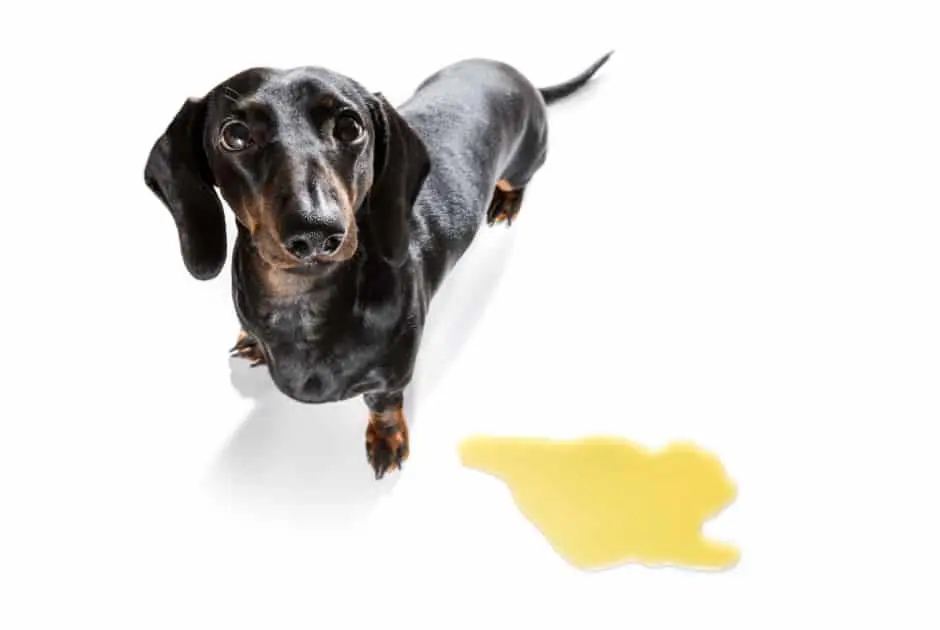Most of the time, owners can allow their dogs to relax, sit, and sleep on their beds without worrying, but some have issues with their dogs peeing on their beds.
This can turn a wonderful afternoon into a sour one real quick. Why do dogs pee on beds? There can be many reasons why your dog is suddenly peeing on your bed.
This article will discuss why your dog peed on your bed and how to correct the situation positively.
My Dog Peed on My Bed – Is This a Dominance Issue?
Dog owners are often mistakenly led to believe that every bad habit their dog develops is rooted in dominance. Some trainers will warn that a dog peeing in a human’s bed is doing so to assert this area of the “den” as his or her own territory.
However, in reality, dogs are not that evil or conniving. While peeing in the bed is rooted in evolution, it has nothing to do with the dominant hierarchy.
Instead, listed below are common reasons for your dog to be bedwetting.
Why Does My Dog Pee on My Bed?
Below are some major reasons why your dog keeps peeing on your bed. You can read through the list and rule out some of these reasons if they do not apply to you or your dog.
Trying to Cover Its Scent
When dogs exist in the wild, they must cover their scent to protect themselves from predators. Young dogs that cannot fend for themselves are especially prone to this behavior.
This is also why your dog likes to roll in the most disgusting items, such as dead animals or feces.
Puppies, or even dogs that did not lose this natural instinct as they age, will often find areas of the house that contain the scent of their owners (i.e., their protectors) and immerse themselves in that odor.
They may find your dirty laundry and roll around in that, or, more often, they will find your bed, which contains the greatest amount of your odor.
If your dog has to potty and can no longer hold it (especially if he or she is a young dog), going in your bed seems safe since it will hide the scent of the urine (at least to your pup’s overly sensitive nose!).
Scared or Anxious
As a corollary of the above reason, your pet may urinate on your bed to soothe him or herself after a particularly upsetting incident.
Does your pet pee on your bed after being scolded or when you leave for extended periods of time? If so, your dog may urinate on the bed out of fear.
While some owners may feel that their pet is doing this to “get back” at the owner after a particularly harsh scolding or because the owner was gone longer than normal, in actuality, your dog is simply frightened, and peeing in your bed is a coping mechanism to cover his scent in that of his protector’s.
While this behavior is strange, you can rest assured that your pet is not simply vindictive.
Medical Condition
If this behavior appeared suddenly, especially if your dog is older, it could indicate an underlying medical condition.
Dogs that have been reliably potty trained do not like to urinate in the house, and it may be extremely distressing to them if they feel the need to go but cannot hold it.
In this instance, peeing in the bed may be a combination of covering their scent and being fearful. It would be best to have your pet checked by a veterinarian to rule out causes such as a urinary tract infection, incontinence, or diabetes.
The dog is Overly Submissive
While many prefer to own submissive dogs because of their eager-to-please personalities, dealing with submissive urination can be a huge headache for a pet owner.
Dogs that submissively urinate may do so when frightened, excited, happy, anxious, or for seemingly no reason.
A dog urinating out of submission is also letting everyone know that he or she respects all other dogs, humans, and animals in the house.
While your submissive pet may be easy to get along with, unfortunately, he or she may think that urinating in your bed (the area that smells most like you) is a sign of ultimate respect.
Still a Puppy
Puppies usually will have issues holding in their bladder for the first few months to up to a year. You must be consistent with puppy potty training when it comes to your puppy.
Take your puppy out for frequent potty breaks when you are home. This will reduce the chances of your dog having an accident inside.
If you are unable to during the day, hire a dog walker or a neighbor to come over to check on your puppy and let it out to go to the bathroom.
More Bathroom Breaks
Some dogs just need more frequent bathroom breaks than other dog breeds. You should take your dog out frequently, especially if your dog is having an issue with peeing on your bed and in the house.
After mealtimes, wait about 15 to 20 minutes and then take your dog outside to do its business. You can even take your dog on walks to give your dog plenty of opportunities to use the bathroom.
In some cases, this might fix the issue entirely, but if it doesn’t, you can eliminate this and see if the other ones apply to your dog.
How to Stop Dog From Peeing on Bed
The first step to training your dog not to pee in your bed is to understand the underlying cause of the behavior better.
Avoid Angry Reactions
If you react to your dog peeing negatively, you can scare and frighten your dog even more than it already is. Showing signs of aggression will make your dog fearful, which will not solve the problem.
Try to remain calm even if you are furious on the inside. You can always try to calmly discipline your dog without shouting, yelling, or hitting your dog for peeing in your bed.
Tell your dog no that it was wrong of him or her to pee on the bed instead of outside.
Make the Bed Off-Limits
Your dog cannot pee on the bed if he or she cannot access the bed. Unless you are in the room with your dog, always keep the bedroom door closed.
You may wonder whether this will cause your dog to urinate in another area of the house, such as on the couch or floor. If your pet has only peed on your bed thus far, there is little chance he or she will suddenly choose to pee elsewhere.
If, however, limiting access to the bed does cause urination in other areas of the house, then a refresher course in potty training may be necessary.
At the very least, making the bed off-limits will eliminate the need to have to wash the sheets and disinfect the mattress.
Crate your dog
If you cannot restrict your dog from the bed, consider crating your dog when you cannot keep an eye on him or her. With patience and a positive attitude, nearly every dog can learn to love the crate.
The key is to train your dog using positive reinforcement and treats gradually. Initially, feed your pet meals in the crate and slowly work towards leaving him or her kenneled for 3- 4 hours while you are away.
Not only will the crate keep your dog avoiding your bed, but it will also help reinforce potty training if that is still an issue.
Take an Obedience Class
Even if your pet has learned basic commands, obedience classes can teach an owner far more than simply how to make a dog sit, stay, or come.
In reality, obedience lessons reinforce communication skills between dog and owner and help create a stronger bond between the pair. Often, lapses in potty training and inappropriate elimination in the house are miscommunications between dogs and owners.
Sometimes the dog is trying to send a message and feels it must resort to extreme behaviors to get the point across. Other times, the dog does not understand what the owner means when he or she asks if the dog wants to go outside or says, “I’ll be right back.”
Attending a refresher course on basic commands can help remind both pet and owner how to communicate effectively.
Use a Belly Band
When all else fails, a belly band will help teach your dog not to urinate inappropriately on the bed. A belly band is a strip of fabric that wraps underneath your dog and is held in place with Velcro.
A feminine pad or diaper is placed inside the belly band, and if your dog chooses to urinate in the house, your pet will pee on him or herself, quickly teaching your pet right from wrong.
Some made today are completely disposable, like the product below. It will provide your home with protection from your dog urinating uncontrollably. The material on the side is leak-proof and extremely absorbent. When your dog fills it up, throw it away and use a new one.
As an Amazon affiliate, we earn from qualifying purchases at no cost to you.
Cleaning Up After Your Dog Pees on Bed
Perhaps the most important aspect of discouraging your pet from peeing on the bed is removing all odors from the sheets and mattress – yours and his.
Removing Canine Scents
Did you know that dog urine contains enzymes that only your dog can smell, even if you have thoroughly cleaned the area of the accident?
Additionally, these enzymes act as a calling card to remind your pet to return to the crime scene for future calls of nature.
Many pet owners sabotage their own attempts at remedying their pet’s inappropriate urination problems by not properly cleaning up after these accidents.
The only way to thoroughly clean up every trace of a dog’s odor is to use an enzymatic cleaner, such as Rocco & Roxie Professional Strength Stain & Odor Eliminator. There is a reason why it has 4.5 stars with over 100,000 reviews!
This spray cleaning solution should be sprayed directly onto the sheets and mattress stains to eliminate proteins that cause your pet to return to the same area.
The product does have a smell, but it doesn’t smell like a chemical scent. It is mild for most people, so you shouldn’t be concerned about that.
Removing Human Scents
Just as removing the dog’s scent is important, removing your own odor is necessary to make your bed a less appealing retreat when your dog is frightened, anxious, or looking for protection.
Be sure to wash your sheets regularly. If you are prone to night sweats, changing your sheets daily may be necessary to hide your odor from your pet.
Conclusion
Now that you have leaped to figure out why your dog pees on your bed, I hope I was able to help you find the answer. There are many reasons dogs pee on beds, so I hope my list helped narrow it down for you.
Remember, even though this is very frustrating, try not to yell or get aggressive with your dog because that will do more harm than good.
How has this experience been for you? Please comment below and let us know what you did to stop your dog from continuing this habit and what was causing it.







